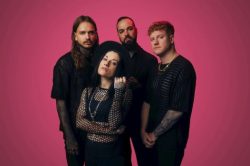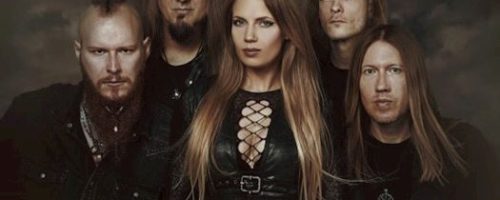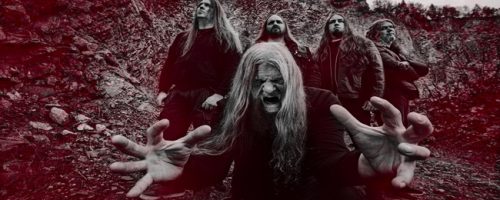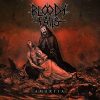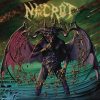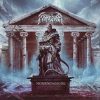Ronnie Atkins – A Therapeutic Shot
Thursday, 18th March 2021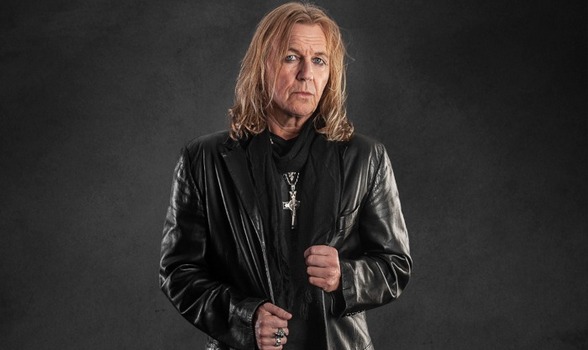
Best known for his work since the early 80’s with Danish melodic metal/hard rock act Pretty Maids, singer Ronnie Atkins found out last year that he had incurable stage four cancer. In a race against the clock, plus the world in lockdown with a COVID-19 pandemic, he felt there’s no better time than the present to put his nose to the grindstone and develop his first solo album. One Shot is the fruits of that labor, eleven songs that still contain that melodic metal/hard rock framework, just with more of an 80’s commercial sheen. Recruiting top flight musicians to aid the cause, it’s a record that allows his magnificent melodies and versatile voice to shine this deep in his illustrious career.
We reached out to Ronnie through Skype and he was happy to let us in on the unusual way of composing and recording this record, thoughts on how he’s handling his cancer diagnosis, changes within the music business, regrets with specific contracts during the Pretty Maids / Future World heydays, and memories surrounding Ronnie James Dio.
Dead Rhetoric: One Shot is your latest solo album – discuss the framework of getting this release out to the public given your stage four cancer diagnosis, as there is a sense of urgency that probably put forth a burst of creative energy unlike at any other time in your life, is that fair to state?
Ronnie Atkins: Yes. The album originally, I didn’t have any intention at this time to do a solo album. Basically it’s something I decided to do after I got the diagnosis with stage four cancer. I was in a panic for a long time. I had a lot of ideas and wrote a lot of songs at the time. It was the only thing I could do, because there was a lockdown as well. I couldn’t meet up with anybody or anything so it was my way to do musical therapy, try to focus on something good and positive and try to park the disease and push the bad things away. And so I did it, it was a goal of mine to do this album. Now I’ve done it.
Dead Rhetoric: Tell us about the interesting challenges regarding your work with Chris Laney and recording the vocals first, then building out the instrumentation from there? Do you believe it all worked out for the best in the end?
Atkins: I think it was totally upside down to the way I normally would do it. You normally do the basic tracks and one of the last things you do is the vocals. Since I was in the situation I was in, I felt I was racing with time. I just had gotten the diagnosis, I checked the statistics and the doctors couldn’t tell me how much time I had left. They just said it was incurable, so I just freaked out. I felt I had a gun against my head, so the way it worked is I sent my ideas to Chris on an iPhone, he recorded a demo and sent it back to me, I did the vocals and sent it back to him. That’s the way it was done, but that said it went pretty smooth all the way through. Chris easily picked up on my ideas, and he was a great one to collaborate with. He’s the one who kicked my ass, let’s do this and go for it – and I’m glad he did. It helped me through all of this.
Dead Rhetoric: Which were some of your favorite songs to work on, and were there any that maybe presented more challenges this time?
Atkins: The thing is, yes and no. When you get some songs, when you write a good song on an acoustic guitar or a piano, and it sounds good, you remember the melody and it’s stuck in your head. Then you decide what are we going to do with this? If it’s going to be more acoustic or more organic. We decided to go for a style that was pretty old school and back to the 80’s. I love 80’s music, and so does Chris. That’s the direction it eventually took and we both agreed on that. It could have gone in different directions. I thought this was suitable for what I’ve done for the fans and followers of my music over the last 30 plus years.
Some songs always turn out of course a little differently than you expect them to be. Take the title track “One Shot” – the song was written totally, and Chris came up with the idea of rocking it up a bit, it has that Queen / “We Will Rock You” type chorus. It was meant to be more big chords in a ballad type thing.
Dead Rhetoric: Was it easy to decide what songs were going to be the singles and video choices?
Atkins: No, that’s very difficult and still is. I think there are eleven good songs on the album, in different ways. All of the songs are melodic, it’s a melodic rock album. We agreed on “One Shot” and “Real”, natural choices. There were a lot of other songs out there, like “Frequency of Love”, “I Prophesize” is very catchy. There will be another song released when the album is coming out. And there might be more, let’s see what happens.
Dead Rhetoric: You have a variety of notable singers and musicians that added their talent to this record – including Kee Marcello, Oliver Hartmann, Pontus Norgren, Björn Strid, and two of your fellow Pretty Maids compatriots. How does it feel to have some of your peers, even in other outside styles, putting their stamp and style to this material – who impressed you the most?
Atkins: All of them impressed me, and they are all brilliant musicians. The reason why those guys are playing on the album is I did a cameo appearance with Chris Laney and many of those musicians on At the Movies where they re-record all those 80’s hits and I was participating on one of those songs, “We Don’t Need Another Hero” originally done by Tina Turner. That was the first song I sang after I had all the treatments, for a while I couldn’t sing because I was coughing so much and I wasn’t really sure I would be able to hit the high notes again. We talked about which musicians were going to play on the album, I know a lot of people. I’m here in Denmark, Chris is in Stockholm, Sweden – Chris suggested us using the people that played in At the Movies, the whole foundation. He knew a lot of the guitarists, I knew Oliver Hartmann and asked him during the summer – so he plays on a couple of solos as well. It is an outstanding gig – it was great to have a female like Linnea (Vikström Egg), singing on the album because on a few of the songs there’s almost a gospel-type feel to it. I never have had a female singer on any of the Pretty Maids albums so, it was good.
Dead Rhetoric: How do you feel about Frontiers Music and what they provide to push and promote your work with Pretty Maids plus this solo release over the years?
Atkins: I think that the music business has changed a lot. I don’t think it’s easy these days. They have done a great job for this album as far as I’m concerned. They’ve done a lot of promo, ads, and pushing this as much as they can.
Dead Rhetoric: What would you most like the world to remember about Ronnie Atkins when it comes to you as a person and throughout your musical career?
Atkins: That he was a nice guy. I hope people will remember me for the music that I’ve done. Hope I’ve done some good songs that people will remember me for. The performances – I’m here to do that. I don’t see myself particular as an artist, I’m more like an entertainer that gives people a good time. I hope I give people a good time whether they see me live or hear me on record. And those that know me hopefully will remember me for being a fair and square guy.
Dead Rhetoric: When younger musicians seek to learn words of wisdom from your career or things that they should apply to their lives, what sorts of advice or insight do you try to provide?
Atkins: For young musicians, get a good lawyer. Get somebody that knows something about the business before you sign on the dotted line. Believe in yourself and what you do, stick to that. If nobody else believes in you, believe in yourself and you will get there, hopefully.
Dead Rhetoric: Is that a situation where you wish you had taken more time with contracts in the early days of Pretty Maids?
Atkins: When we started out, nobody really believed in us. The record companies in Denmark, when we sent out the first cassette tapes they thought we were never going to get a record deal with that kind of music. We had to go outside of Denmark, and we believed in ourselves so much, we made it. Future World was the big breakthrough for us back then, and unfortunately we were so stupid we didn’t have any advisors or anything when we signed the contracts. We were stuck with these contracts for ages, and still the record company owns all the rights to Future World, even thirty-five years on. There’s a lot of stuff I would have done differently had I had the knowledge.
Dead Rhetoric: How do you see the evolution of the music business from the time you evolved in the 1980’s through today’s marketplace – what are some changes you enjoy or things that you believe could be improved?
Atkins: Wow. There are new genres that are coming and going all the time. It’s weird, the worst thing is you don’t sell physical CD’s anymore, or vinyl, not as you used to do in the 80’s because of downloading and the internet and streaming. It’s not the same amount of money involved it in anymore. I can see what young bands are being offered by record companies now to do an album – they are only capable of doing it because they have home studios with ProTools at their disposal, sending files back and forth. They can’t go into a professional studio like we did – we are pretty old school and met up together. Financially that is impossible for a lot of new bands these days.
It’s funny, you do an album and then go out and play live concerts. Back in the day you went out to play live to promote the album, and now it’s the other way around.
Dead Rhetoric: Do you have a preference for the studio or the stage – or do you enjoy both equally for different reasons?
Atkins: I love them both. When I was a kid I went to my first concert in the 1970’s, I had a dream of one day doing my own album and standing up on stage and performing my music for people. All of that I’ve achieved. I like the whole process of writing and recording, but I like them both equally.
Dead Rhetoric: You took on the stage name Ronnie due to your love and respect for Ronnie James Dio. What are some of your favorite memories surrounding this iconic singer, did you ever get the chance to hang out/ talk with him in person?
Atkins: Yes, I met him twice. First time was in 1987 on the Monsters of Rock festival, we played as well. And I met him again in 1989, and that time I actually had the chance to talk to him. He was a super cool guy, a super nice guy. I was starstruck of course when I met him. He was so gentle, I can’t say a bad thing about him. He was a great singer. Amazing human being I would say. I have my Rainbow favorites of course- songs like “Stargazer”, “Tarot Woman”, Black Sabbath with Heaven and Hell and The Mob Rules albums – I can’t pinpoint any songs, I love them all. And the first couple of Dio solo albums as well.
Dead Rhetoric: When it comes to your own voice over the years, how do you assess your work and how it’s changed over the forty plus years of recording?
Atkins: Of course it changes with age. I’ve been doing pretty good, particularly in the recent years, especially with the last ten-eleven years since we did with Pretty Maids the Pandemonium album. My voice, it’s a clean voice and then I have this snarly, edgier, voice, rougher. I didn’t do anything in particular to take care of it, I’m a heavy smoker and had my share of alcohol. You have to change things up a little with age, and I had to adjust. I never took lessons, I am a self-made man. I have my own ways of doing things that I can pull off. I hope we will be back on stage again at some point.
Dead Rhetoric: What are some of your interests and hobbies away from music when you have the free time to pursue them?
Atkins: I like walking in the woods, I like nature. I like sports like tennis, soccer. I go to the gym every day to keep myself going. I like watching a good movie or series. Sometimes reading, and I am a big news freak to be honest with you.
Dead Rhetoric: What concerns you about the world that we live in today, especially dealing with this pandemic? How do you think humanity will be pulling out of this?
Atkins: I don’t know, it’s hard to predict. Sometimes I’m thinking this corona thing is nature’s way of payback. I saw some You Tube clips with the markets over in Asia with animals from all over the world, in boxes all on top of each other. That’s wrong, we should treat the animals with respect, we should treat each other with respect. There’s so much hatred going on, division, and I hope that will turn out for the better in the future.
Dead Rhetoric: What is in store for fans of Ronnie Atkins and his musical activities over the next six to twelve months? Will you begin working on another Pretty Maids album, or a second solo outing, while awaiting live shows/festivals to return once the pandemic clears safely enough for musicians to return to the stage?
Atkins: I have no plans. Regarding live concerts, nobody really knows when we will get back to normal. We hope for concerts in the late fall, but nobody really knows. One thing is the lockdown and my personal health situation it’s difficult for me to plan where I will be in three to six months. I just want to go ahead, keep writing songs, that’s all I can do right now. I haven’t made any plans – my biggest dream and hope is to be back on stage and perform.











